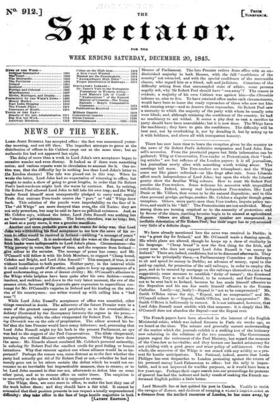NEWS OF THE WEEK.
Loan Josue RUSSELL has accepted office: the fact was announced yester- day morning, and not till then. The imperfect attempts to guess at the distribution of offices in his Cabinet crept out at the same time; but an authentic list had not appeared last night.
The delay of more than a week in Lord John's own acceptance began to ()woolen wonder and even dismay. It looked as if there were something amiss; and various reports were in circulation to account for it. One no- tion was, that the difficulty lay in nothing less than Lord John's letter to the London electors! The tale was pieced out in this way. When he wrote the letter, Lord John had no expectation of -returning to office, but sought to make a show of going to great lengths, in order that Sir Robert Peel's backwardness might look the worse by contrast. But, by retiring, Sir Robert Peel allowed Lord John to fall into his own trap; and the Whig leader found himself most unexpectedly pledged to carry total repeal! Froth that extreme Free-trade course the " pure" or u old" Whigs drew back. This solution of the puzzle wore improbobflity on the face of it. The "old Whigs" are more decayed than eveauthe old Tories: they are not only powerless, but may be said to have no political existence. And, as Mr- Cobden says, without the letter, Lord John Russell was nothing but an " obscure " private gentleman. The letter, therefore, was noirap; but, at least as a party move, it was a genuine manifesto.
Another and more probable guess at the reason for delay was, that Lord John was withholding his final acceptance to see how the news of his re- turn to office would he received in Ireland—awaiting "a message of peace" from Mr. O'Connell. It is understood that the votes at the disposal of the Irish leader were indispensable to Lord John's plans. Circumstances—the 'Whig poverty in votes, the lapse of time, and the response from Ireland— give colour to the surmise. The message of peace has come; and Mr. O'Connell will follow it with his Irish Members, to support " Cheap bread, Cobden and Bright, and Lord John Russell!" This compact, if true, is not without humiliation to both parties. Neither party, in the interval while it could make no profit of the other, took pains to keep up appearances of a good understanding, or even of decent civility: Mr. O'Connell's allusions to the Whigs while helpless have been quite after his own fashion—coarse, insolent, and reckless; and down to the very latest moment, the eve of the present crisis, favoured Whig journals gave expression to supercilious con- tempt for Mr. O'Connell's vagaries in Ireland and his trading on the mise- ties of his countrymen: one writer wound up with calling him a "bad man "1
While Lord John Russell's acceptance of office was unsettled, other things remained in doubt. The adherents of the future Premier were in a state of the greatest suspense and perplexity as to the eventualities; a dubiety illustrated by the discrepancy between the organs in the press,— one propitiating, while the other vituperated Sir Robert Peel. The Morn- ing Chronicle was on the side of propitiation. The editor avowed his be- lief that the late Premier would have many followers; and, presuming that Lord John Russell might try his luck in the present Parliament, an eye was had to the support of the Peel Conservatives. The Globe vituperated; pursuing the retired Minister with opprobrium. Other Whigs have done the same: Mr. Ricardo almost emulated Mr. Cobden's personal animosity, in refusing Sir Robert Peel the smallest credit for good feeling or honest intentions. Why that rancour against one whose alliance would be so im- portant? Perhaps the reason was, some distrust as to the fact whether the party bad actually got rid of Sir Robert Peel or not,—whether he had not merely gone out to let others sustain the defeat which be would not en- counter on an inevitable but impracticable measure, then to return; or to let Lord John succeed in that one act, afterwards to defeat him on some other point, and so to resume office on easier times. The suspicion is as unworthy as the spleen which it is supposed to create.
The Whigs, then, are once more in office, to make the best they can of the work before them; and they should have a fair trial. It cannot be concealed that their position presents in one respect a totally unprecedented difficulty: they take office in the face of large hostile majorities in both
Houses of Parliament. The late Premier retires from office with an un- diminished majority in both Houses, with the full " confidence of the country" not retracted, and with the special confidence of the mercantile classes, who regard him as a friend, safe and judicious. Conscious of the difficulty arising from that unexampled state of affairs, some persons angrily ask, why Sir Robert Peel should have " run away"? The reason is evident; a majority of his own Cabinet was against him—the Chronicle: informs us, nine to five. To have retained office under such circumstances, would have been to incur the ready reproaches of those who now tax him with running away—and to deserve those reproaches. Sir Robert Peel saw a necessity to which the majority of the party with whom he usually acts were blind; and, although retaining the confidence of the country, he had no machinery to act withal. It seems a pity that so vast a sacrifice to party should have been unavoidable; but it is now done. The Whip have the machinery; they have to gaiu the confidence. The difficulty will be best met, not by overlooking it, nor by dreading it, but by acting up to it with boldness, and above all with transparent honesty.


























